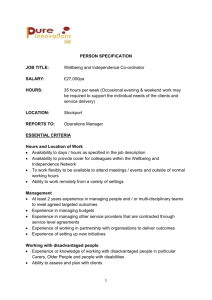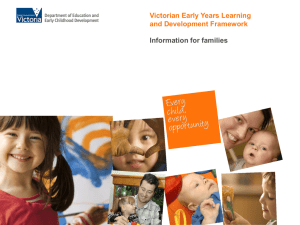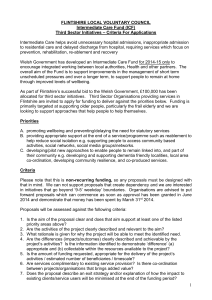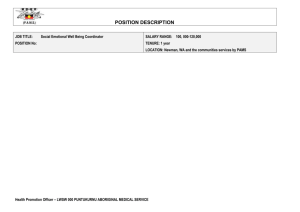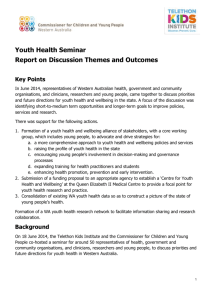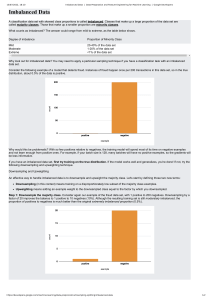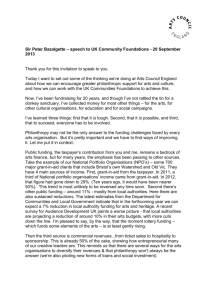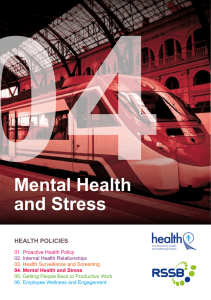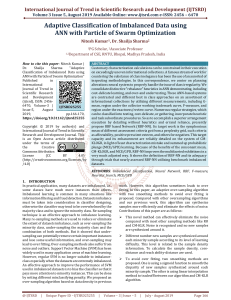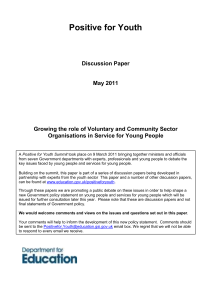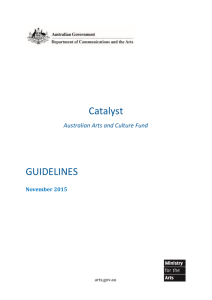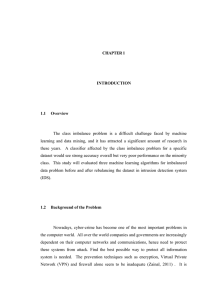MANAGING WORK LIFE BALANCE MAKING THE
advertisement
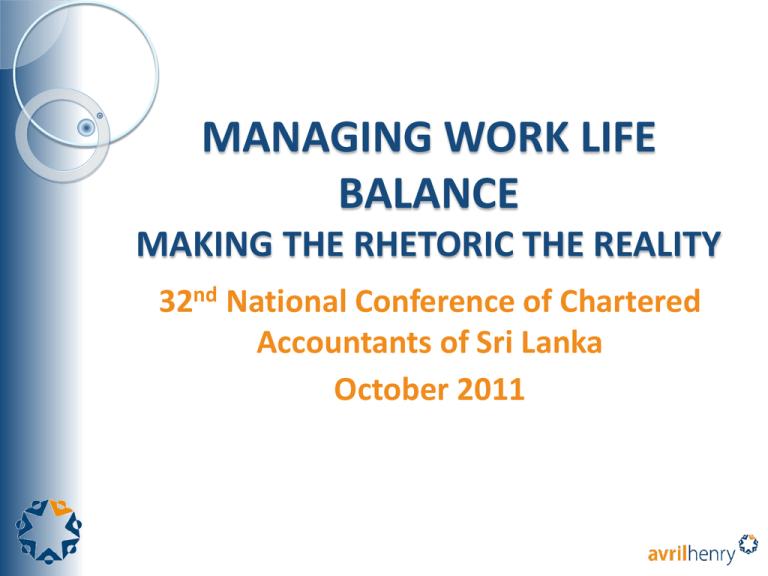
MANAGING WORK LIFE BALANCE MAKING THE RHETORIC THE REALITY 32nd National Conference of Chartered Accountants of Sri Lanka October 2011 Contents Policy vs.Reality Best Employers How Each Generation Defines Work Life Balance Flexible Work Practices & Wellbeing Benefits of Flexibility to Business Why is Balance Important to Business? How Can Business Help Employees Find Balance? How Can Business Support Balance? How Can Employees Support Balance? Leadership & Balance The faster we go, the slower we need to be. Peter Senge Policy vs. Reality Many organisations have well written policies gathering dust on shelves, or on-line, but not accessible or being accessed Reality = “I need more time to do the things I want…….…” “All I do is rush from here to there..........” “I really need to get more balance in my life” “I work smart, am focussed, and get my work done, but am still seen as less committed because I work flexible hours” Best Employers Hewitt’s Surveys found employees believed these organisations demonstrated: Excellence in leadership Focus on performance and results, and performancebased rewards and recognition High levels of employee engagement Open, honest and regular communication Accelerated development of their people Enabled work / life balance How Does Each Generation Define Work Life Balance VETERANS (Born Before 1946) Work and Life are completely separate Work = 9-5 or 8-6 Life = After 6pm and weekends Few or no friends at work How Does Each Generation Define Work Life Balance BABY BOOMERS (Born 19461964) Work and life separate, but work dominant, “workaholic” generation Adverse impact on personal life and relationships Re-evaluate work / life balance in mid to late 40’s Have acquaintances and colleagues at work How Does Each Generation Define Work Life Balance GENERATION X (Born19651979) Work is a means to an end They do not define themselves by what they do Will expect flexibility to pursue what is important to them Relationships at work are important to achieving outcomes How Does Each Generation Define Work Life Balance GENERATION Y (Born 19801995) “I have a life”. There is no separation of work and life Work is an extension of their social life A “sense of belonging” is important Have many friends at work, and value teamwork Flexible Work Practices & Wellbeing Flexible Hours Part-time work Job sharing Study Leave & Assistance Moving Leave Parental Leave Career breaks Child care Elder care information/ referral services Family Leave Subsidised health funds Subsidised gym memberships Well being services eg yoga, massage, fruit EAP and counselling services Benefits of Flexibility to Business The organisation is seen as an Employer of Choice Greater pool of potential employees to select from Lower staff turnover, higher retention Reduced absenteeism Greater employee engagement Enhanced customer service, due to happier, productive employees Good publicity and public profile, enhancing corporate reputation Why is Balance Important to Business? Now and in the future, demand for labour will exceed supply, locally and globally Balance is an important attraction and retention strategy for Generations X and Y Imbalanced organisations full of imbalanced individuals create “burn out” Knowledge workers will choose to stay with an organisation when it, and their lives, feel balanced Creating balance and valuing people improves the chance of retaining valuable staff Balance reduces stress and workplace conflict How Can Business Help Employees Find Balance? “All a company can do is facilitate balance. It cannot create it, and should not be seen to have the full responsibility for doing so. The secret of finding balance is internal. But business can do a lot to make it easier for us to maintain balance; and business will in turn benefit enormously”. Dr James Cowley How Can Business Support Balance? Communicate support for flexibility to staff regularly Revise policies to position balance as a business tool Allowing staff to work from home, with the appropriate tools Genuine consultation within the workforce through surveys and focus groups Encouraging staff to go home when they have finished work. Commitment ≠ Hours in office How Can Business Support Balance? Seniors managers leading by example through behaviours and actions Encouraging part-time work with systems to facilitate this Articulating and effecting balance between the needs of the business and employees Educate and support managers to enable flexibility within their teams How Can Employees Support Balance? Work smart. Strive to be more efficient and rethink processes that are not working Support flexibility and balance among co-workers Suggest creative solutions that increase efficiency Proactively think about how requests for flexibility can be managed and identify challenges Be flexible about flexibility! It’s give and take! Clearly communicate availability and ways to be reached for urgent issues Maintain strong performance regardless of when and where work happens Source: Beyond Flexibility, Catalyst Leadership and Balance Wise leaders grasp the connection between workplace and employee sustainability They connect process improvements with work-life effectiveness They understand that being collaborative will ensure adaptable responses to new markets and customers They challenge out-dated work practices They understand that encouraging their employees to refuel and be resilient adds to, rather than detracts from, business results Source: Beyond Flexibility, Catalyst Conclusion Happiness is not a matter of intensity but of balance, order, rhythm and harmony. Thomas Merton Avril Henry Managing Director Level 4, Suite 4.13 55 Miller Street Pyrmont NSW 2009 Australia Phone: (612) 9660 2400 Email: enquiries@ahrevelations.com Web: www.avrilhenry.com.au


